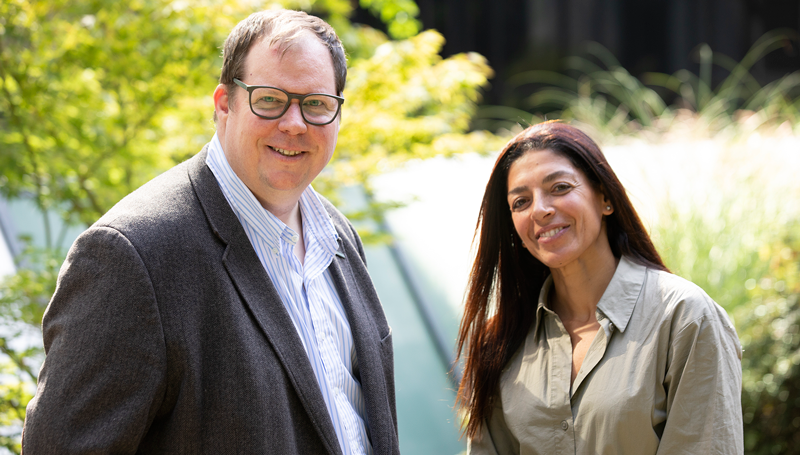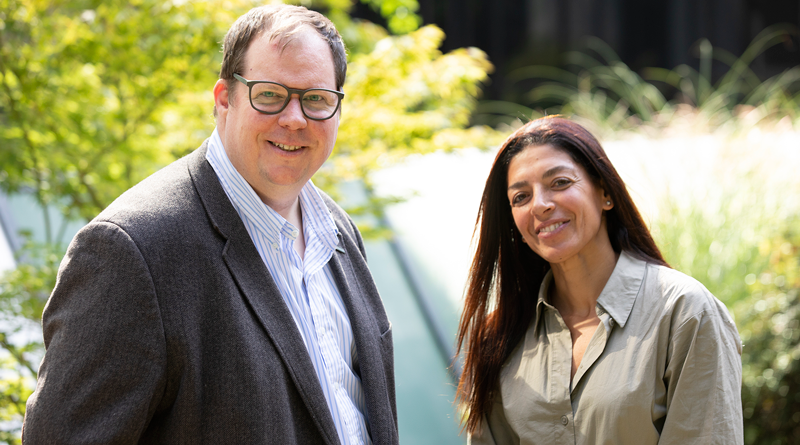MANAGEMENT CHANGES AT EUROCADRES

At the end of this month, Nayla Yazbeck Glaise will probably be elected to succeed Martine Jeffen as president of Eurocadres, as she is the only candidate. Eurocadres is a trade union that defends the interests of executives at a European level. That is important, because labour legislation is becoming more and more European. Therefore, employees must be represented there as well.
They both look very happy during the interview – seeing each other live after one year and a half, that is so nice! Martin and Nayla are both ready to get to work. They enjoyed their holidays. They decided to get away from it all. Or maybe not completely, Nayla admits. She could not help checking her e-mails from time to time and reply to some of them too. However, that did not stop her from enjoying her time off. Martin, on the other hand, did not think about work at all for a few weeks. Disabling some apps can help, he explains.
Digitisation
That leads us to a few of the topics Eurocadres is working on. The right to disconnect is one of them. So is digitisation, and the consequences of it for employees. It is a topic that Nayla wants to work on in the years to come. As a computer engineer and consultant, she knows that digitisation has enormous consequences for employees and their organisations. “The pandemic has accelerated these evolutions. Digitisation creates new opportunities. Time and location-independent work has a lot to offer, but it also brings new risks with it. For instance, the blurred line between work and private life. Technology should make the employees’ work easier, which is what we want to focus on with Eurocadres, on a European level.
European legislation or standards are necessary, because what country you work in is becoming less important. However, the national rules are different everywhere.” Martin adds: “European rules are often a lever for national agreements or social dialogue between employees and employers. That remains necessary, of course. Europe often stimulates the development of national agreements. Especially in countries where social dialogue is not working well, Europe can stimulate that dialogue.”
Whistle-blowers
In the past few years, Martin and Eurocadres have strongly focused on regulations for whistle-blowers. He is quite proud of the result. “We have advocated it for years. At the end of this year, the EU whistle-blower protection directive should result in national legislation in all the EU member states. This legislation will protect employees if they denounce irregularities within the company they are working for. Executives are often the first people to discover information about corruption, fraud or other malpractices that should be disclosed in the general interest.” Eurocadres took the lead in the fight. It was no easy task, however. “The fact that we managed to put this topic on the agenda of the Commission is quite unique. We are often consulted to give our opinion about the topics on the table, but putting something on the agenda ourselves is entirely different. We managed to exert enough pressure, however, by continuously working on the topic and developing projects together with the national trade unions. That cooperation between national trade unions and other NGOs is essential for us. Eurocadres has only four staff members. We can only succeed if we cooperate with our members and partners. We need permanent consultation, as everyone focuses on something else. We move forward together.”
“In what country you work, matters less and less.”
P&M
Eurocadres specifically focuses on P&Ms or ‘Professionals and Managers’. “It is a group that is somewhere between employees and employers. They are employees, but are also involved in company strategies and policy. They can be advocates for employee rights, as they have a certain degree of power or influence within the company. Because of their position, they also have specific needs,” says Nayla. They are often the first ones to be confronted with new issues that require social dialogue. They often do not cooperate with their trade unions. “It does not have to be like that,” explains Nayla. “With the right offer and a focused approach, they can be convinced of the added value. What it comes down to is being close to them and listening to what is going on among employees. We do not decide what is important on our own, but make choices together. Trade unions have a lot to learn in that area. They can learn from each other as well. Therefore, exchanging ideas on a European level can be very interesting.”
Staying in touch
Martin is to leave soon for the Swedish trade union Unionen, thus leaving his post to Nayla. She continues to work for consultancy company Accenture, where she has been exempted part-time for trade union work at the French executive union UGICT for some time, which now turns into Eurocadres. She thinks it is important to stay in touch with her colleagues and the company. “It will not be easy, as I usually work in Brussels during the week. Staying in contact will help me keep the finger on the pulse,” she says. We cannot stress enough how important that is, adds Martin. “When we talk with our sub-organisations, we know what is going on. Psychosocial risks, up- and reskilling, sustainability and equal opportunities are some of the themes we want to make progress in. We can only do that together.”
Listening
He advises Nayla to listen well to what is going on on the shop floor and to start an open dialogue on this basis. “The discussions can be tough, but very valuable. My work as president of Eurocadres was very interesting in that respect. It broadened my perspective. Human interaction drives progress. We did not always succeed in the past, because the screens hindered real contact. I hope we can meet each other ‘live’ again soon.”
He also has a message for the national trade unions. “Stay engaged! Eurocadres can only move forward if the sub-organisations cooperate. Dialogue has led to results on topics such as whistle-blowers or stress management. We still have a lot of challenges on our priority list.”
Never Work Alone 2021 | Author: Jan Deceunynck | Image: Daniël Rys

